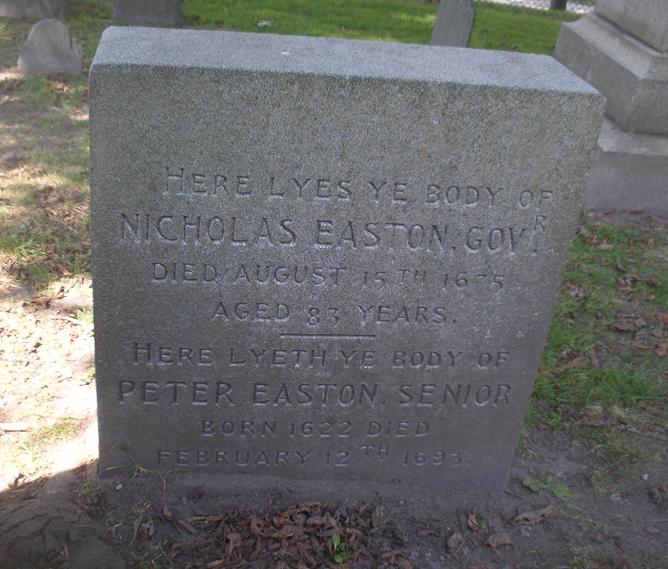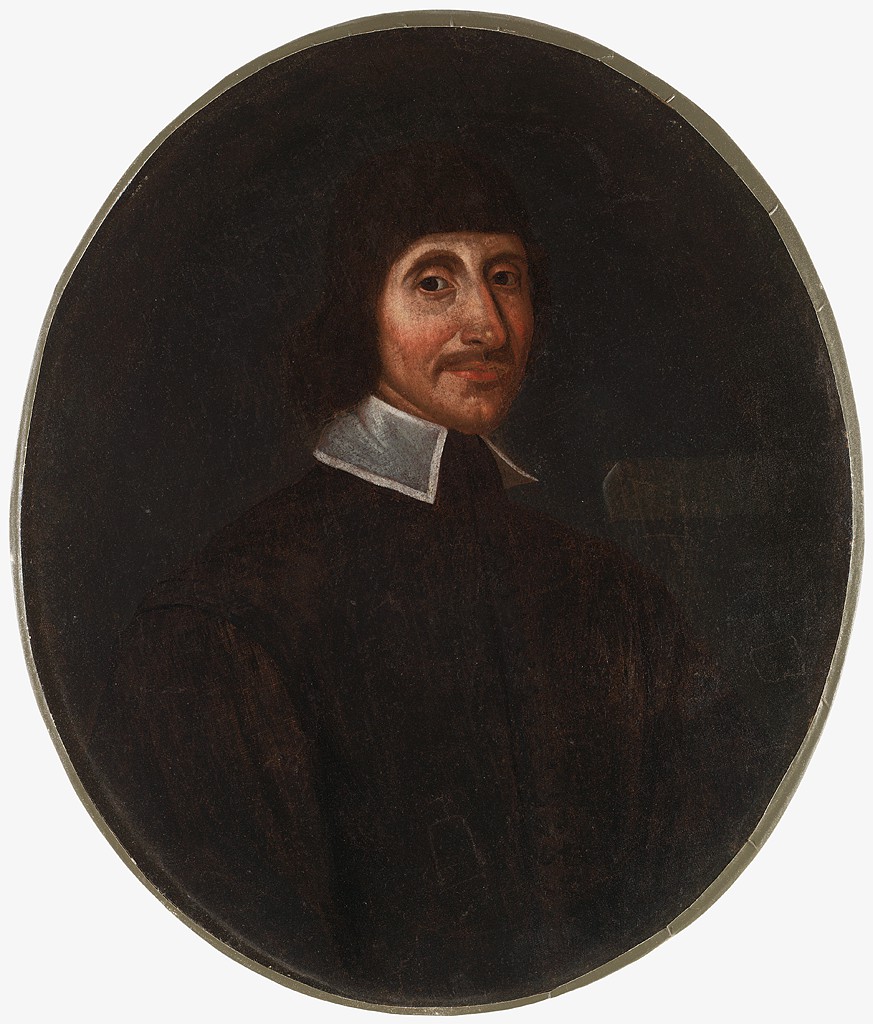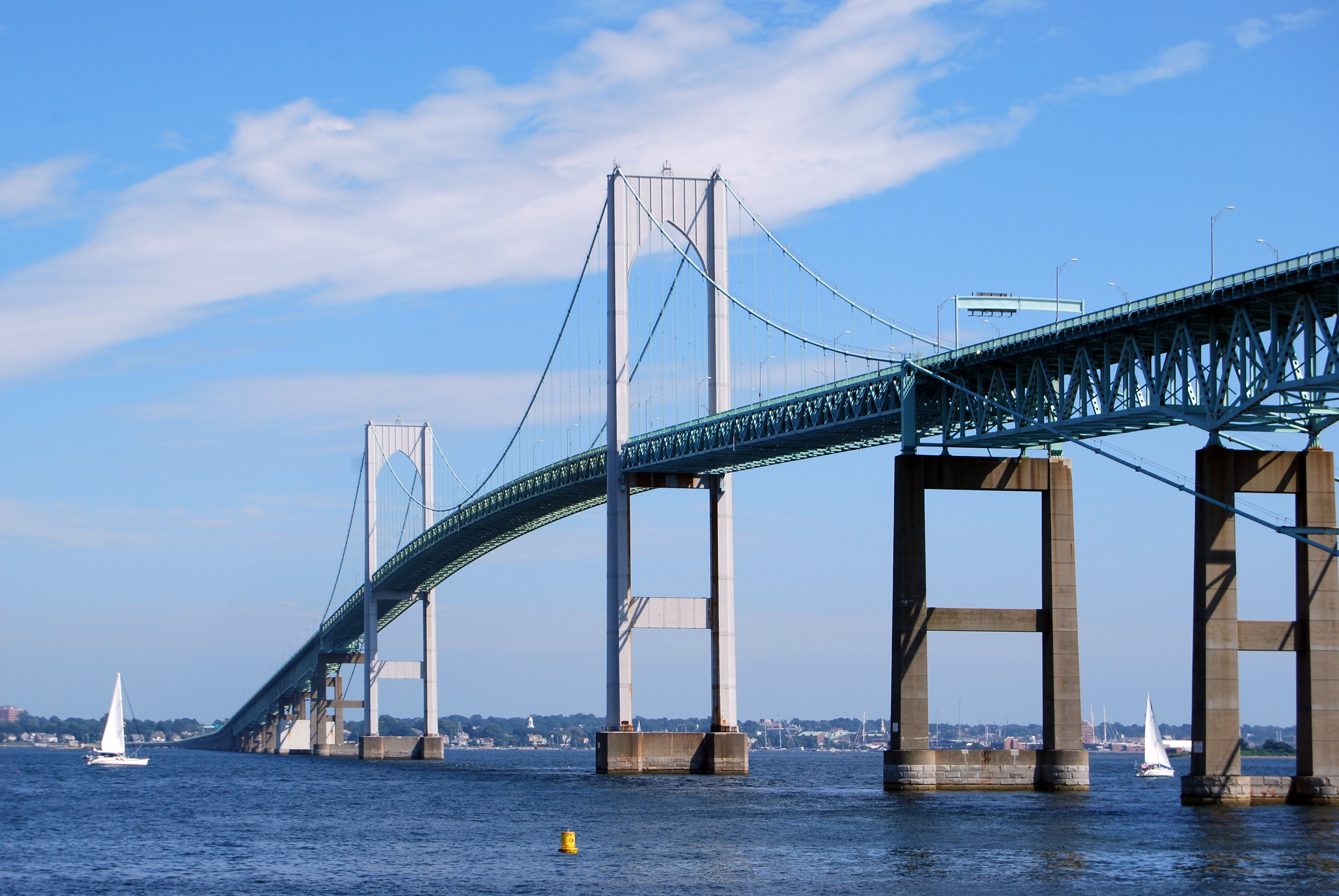|
Nicholas Easton
Nicholas Easton (1593–1675) was an early colonial President and Governor of Rhode Island. Born in Hampshire, England, he lived in the towns of Lymington and Romsey before immigrating to New England with his two sons in 1634. Once in the New World, he lived in the Massachusetts Bay Colony towns of Ipswich, Newbury, and Hampton. Easton supported the dissident ministers John Wheelwright and Anne Hutchinson during the Antinomian Controversy, and was disarmed in 1637, and then banished from the Massachusetts colony the following year. Along with many other Hutchinson supporters, he settled in Portsmouth on Aquidneck Island, later a part of the Colony of Rhode Island and Providence Plantations. He was in Portsmouth for about a year when he and eight others signed an agreement to create a plantation elsewhere on the island, establishing the town of Newport. In Newport, Easton became active in civil affairs, serving as assistant to the governor for several years, and in 1650 wa ... [...More Info...] [...Related Items...] OR: [Wikipedia] [Google] [Baidu] |
John Smith (President Of Rhode Island)
John Smith (died 1663) was an early colonial settler and President of the Colony of Rhode Island and Providence Plantations. He lived in Boston, but was later an inhabitant of Warwick in the Rhode Island colony where he was a merchant, stonemason, and served as assistant. In 1649 he was selected to be President of the colony, then consisting of four towns. In 1652 he was once again chosen President, but the two towns on Rhode Island (Newport and Portsmouth) had been pulled out of the joint colony, so he only presided over the towns of Providence and Warwick. An important piece of legislation enacted during this second term in 1652 abolished the slavery of African Americans, the first such law in North America. Early career John Smith is first positively seen in the public record in June 1648 when he is listed as an inhabitant of Warwick in the Rhode Island colony. While the historian Thomas W. Bicknell echoes James Savage in stating that Smith sailed from England in 16 ... [...More Info...] [...Related Items...] OR: [Wikipedia] [Google] [Baidu] |
Massachusetts Bay Colony
The Massachusetts Bay Colony (1630–1691), more formally the Colony of Massachusetts Bay, was an English settlement on the east coast of North America around the Massachusetts Bay, the northernmost of the several colonies later reorganized as the ''Province of Massachusetts Bay''. The lands of the settlement were in southern New England, with initial settlements on two natural harbors and surrounding land about apart—the areas around Salem and Boston, north of the previously established Plymouth Colony. The territory nominally administered by the Massachusetts Bay Colony covered much of central New England, including portions of Massachusetts, Maine, New Hampshire, and Connecticut. The Massachusetts Bay Colony was founded by the owners of the Massachusetts Bay Company, including investors in the failed Dorchester Company, which had established a short-lived settlement on Cape Ann in 1623. The colony began in 1628 and was the company's second attempt at colonization. It was su ... [...More Info...] [...Related Items...] OR: [Wikipedia] [Google] [Baidu] |
Quaker
Quakers are people who belong to a historically Protestant Christian set of Christian denomination, denominations known formally as the Religious Society of Friends. Members of these movements ("theFriends") are generally united by a belief in each human's ability to experience Inward light, the light within or see "that of God in every one". Some profess a priesthood of all believers inspired by the First Epistle of Peter. They include those with evangelicalism, evangelical, Holiness movement, holiness, Mainline Protestant, liberal, and Conservative Friends, traditional Quaker understandings of Christianity. There are also Nontheist Quakers, whose spiritual practice does not rely on the existence of God. To differing extents, the Friends avoid creeds and Hierarchical structure, hierarchical structures. In 2017, there were an estimated 377,557 adult Quakers, 49% of them in Africa. Some 89% of Quakers worldwide belong to ''evangelical'' and ''programmed'' branches that hold ... [...More Info...] [...Related Items...] OR: [Wikipedia] [Google] [Baidu] |
John Winthrop
John Winthrop (January 12, 1587/88 – March 26, 1649) was an English Puritan lawyer and one of the leading figures in founding the Massachusetts Bay Colony, the second major settlement in New England following Plymouth Colony. Winthrop led the first large wave of colonists from England in 1630 and served as governor for 12 of the colony's first 20 years. His writings and vision of the colony as a Puritan " city upon a hill" dominated New England colonial development, influencing the governments and religions of neighboring colonies. Winthrop was born into a wealthy land-owning and merchant family. He trained in the law and became Lord of the Manor at Groton in Suffolk. He was not involved in founding the Massachusetts Bay Company in 1628, but he became involved in 1629 when anti-Puritan King Charles I began a crackdown on Nonconformist religious thought. In October 1629, he was elected governor of the Massachusetts Bay Colony, and he led a group of colonists to the New Worl ... [...More Info...] [...Related Items...] OR: [Wikipedia] [Google] [Baidu] |
Royal Charter Of 1663
The Rhode Island Royal Charter provided royal recognition to the Colony of Rhode Island and Providence Plantations, approved by England's King Charles II in July 1663. It outlined many freedoms for the inhabitants of Rhode Island and was the guiding document of the colony's government (and that of the state later) over a period of 180 years. The charter contains unique provisions which make it significantly different from the charters granted to the other colonies. It gave the colonists freedom to elect their own governor and write their own laws, within very broad guidelines, and also stipulated that no person residing in Rhode Island could be "molested, punished, disquieted, or called in question for any differences in opinion in matters of religion". The charter was not replaced until 1843, after serving for nearly two centuries as the guiding force of the colony and then the State of Rhode Island and Providence Plantations. Historian Thomas Bicknell described it as "the ... [...More Info...] [...Related Items...] OR: [Wikipedia] [Google] [Baidu] |
Plymouth Colony
Plymouth Colony (sometimes Plimouth) was, from 1620 to 1691, the British America, first permanent English colony in New England and the second permanent English colony in North America, after the Jamestown Colony. It was first settled by the passengers on the ''Mayflower'', at a location that had previously been surveyed and named by Captain John Smith (explorer), John Smith. The settlement served as the capital of the colony and developed as the town of Plymouth, Massachusetts. At its height, Plymouth Colony occupied most of the southeastern portion of Massachusetts. Many of the people and events surrounding Plymouth Colony have become part of Folklore of the United States, American folklore, including the American tradition of Thanksgiving and the monument of Plymouth Rock. Plymouth Colony was founded by a group of Puritans#Puritans and Separatists, Puritan Separatists initially known as the Brownist Emigration, who came to be known as the Pilgrims (Plymouth Colony), Pilgrims. ... [...More Info...] [...Related Items...] OR: [Wikipedia] [Google] [Baidu] |
List Of Early Settlers Of Rhode Island
This is a collection of lists of early settlers (before 1700) in the Colony of Rhode Island and Providence Plantations. Most of the lists are of the earliest inhabitants of a particular town or area. Indian tribes and leaders The following people lived in Rhode Island prior to Colonial settlement: Wampanoag people lived throughout Plymouth Colony and around Mount Hope Bay in Bristol, Rhode Island *Massasoit, tribal leader, met the Pilgrims at Plymouth *Wamsutta, son of Massasoit, became tribal leader upon father's death but died shortly after *Metacomet, son of Massasoit, succeeded his brother as tribal leader; colonists gave him the name of Philip, at his request; instigated King Philip's War Narragansett people lived throughout the Rhode Island colony *Canonicus, chief sachem, deeded the land to Roger Williams on which he established Providence Plantations *Miantonomo, nephew of Canonicus, sold Samuel Gorton and others the land to establish Warwick, Rhode Island *Canon ... [...More Info...] [...Related Items...] OR: [Wikipedia] [Google] [Baidu] |
Aquidneck Island
Aquidneck Island, also known as Rhode Island, is an island in Narragansett Bay in the state of Rhode Island. The total land area is , which makes it the largest island in the bay. The 2020 United States Census reported its population as 60,109. The state of Rhode Island is named after the island; the United States Board on Geographic Names recognizes Rhode Island as the name for the island, although it is widely referred to as Aquidneck Island in the state and by the island's residents. Aquidneck Island is home to three towns, from north to south: Portsmouth, Middletown, and Newport. Etymology "Aquidneck" is derived from the Narragansett name for the island ''aquidnet''. Roger Williams was an authority on the Narragansett language, but he stated that he never learned the word's meaning. It is unclear how it came to be known as Rhode Island, but the earliest known use of the name was in 1637 by Roger Williams, and it was officially applied to the island in 1644: "Aquethneck sha ... [...More Info...] [...Related Items...] OR: [Wikipedia] [Google] [Baidu] |
Portsmouth, Rhode Island
Portsmouth is a town in Newport County, Rhode Island, United States. The population was 17,871 at the 2020 U.S. census. Portsmouth is the second-oldest municipality in Rhode Island, after Providence; it was one of the four colonies which merged to form the Colony of Rhode Island and Providence Plantations, the others being Providence, Newport, and Warwick. Geography According to the United States Census Bureau, the town has a total area of , of which (39.14%) is land and (60.86%) is water. Most of its land area lies on Aquidneck Island, which it shares with Middletown and Newport. In addition, Portsmouth encompasses some smaller islands, including Prudence Island, Patience Island, Hope Island and Hog Island. Part of the census-designated place of Melville lies within the town boundaries. History Portsmouth was settled in 1638 by a group of religious dissenters from Massachusetts Bay Colony, including Dr. John Clarke, William Coddington and Anne Hutchinson. It is named ... [...More Info...] [...Related Items...] OR: [Wikipedia] [Google] [Baidu] |
Antinomian Controversy
The Antinomian Controversy, also known as the Free Grace Controversy, was a religious and political conflict in the Massachusetts Bay Colony from 1636 to 1638. It pitted most of the colony's ministers and magistrates against some adherents of the Free Grace theology of Puritan minister John Cotton. The most notable Free Grace advocates, often called "Antinomians", were Anne Hutchinson, her brother-in-law Reverend John Wheelwright, and Massachusetts Bay Governor Henry Vane. The controversy was a theological debate concerning the "covenant of grace" and "covenant of works". Anne Hutchinson has historically been placed at the center of the controversy, a strong-minded woman who had grown up under the religious guidance of her father Francis Marbury, an Anglican clergyman and school teacher. In England, she embraced the religious views of dynamic Puritan minister John Cotton, who became her mentor; Cotton was forced to leave England and Hutchinson followed him to New England ... [...More Info...] [...Related Items...] OR: [Wikipedia] [Google] [Baidu] |
Anne Hutchinson
Anne Hutchinson (née Marbury; July 1591 – August 1643) was a Puritan spiritual advisor, religious reformer, and an important participant in the Antinomian Controversy which shook the infant Massachusetts Bay Colony from 1636 to 1638. Her strong religious convictions were at odds with the established Puritan clergy in the Boston area and her popularity and charisma helped create a theological schism that threatened the Puritan religious community in New England. She was eventually tried and convicted, then banished from the colony with many of her supporters. Hutchinson was born in Alford, Lincolnshire, England, the daughter of Francis Marbury, an Anglican cleric and school teacher who gave her a far better education than most other girls received. She lived in London as a young adult, and there married a friend from home, William Hutchinson. The couple moved back to Alford where they began following preacher John Cotton in the nearby port of Boston, Lincolnshire. Cotton ... [...More Info...] [...Related Items...] OR: [Wikipedia] [Google] [Baidu] |
John Wheelwright
John Wheelwright (c. 1592–1679) was a Puritan clergyman in England and America, noted for being banished from the Massachusetts Bay Colony during the Antinomian Controversy, and for subsequently establishing the town of Exeter, New Hampshire. Born in Lincolnshire, England, he graduated from Sidney Sussex College, Cambridge. Ordained in 1619, he became the vicar of Bilsby, Lincolnshire, until he was removed for simony. Leaving for New England in 1636, he was welcomed in Boston, where his brother-in-law's wife, Anne Hutchinson, was beginning to attract negative attention for her religious outspokenness. Soon he and Hutchinson accused the majority of the colony's ministers and magistrates of espousing a "covenant of works". As this controversy reached a peak, Hutchinson and Wheelwright were banished from the colony. Wheelwright went north with a group of followers during the harsh winter of 1637–1638, and in April 1638 established the town of Exeter in what would become th ... [...More Info...] [...Related Items...] OR: [Wikipedia] [Google] [Baidu] |









